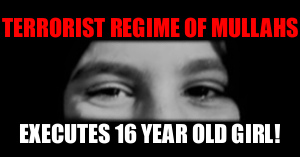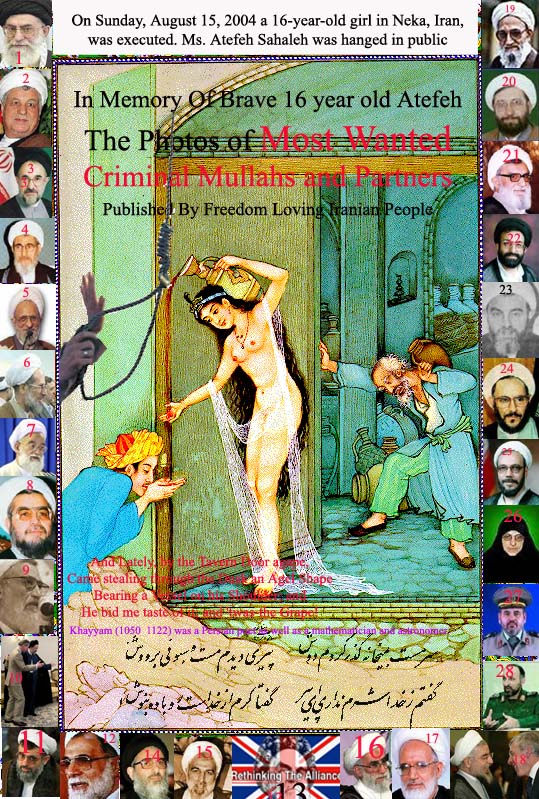
Posted on 08/23/2004 8:01:10 PM PDT by faludeh_shirazi
Amnesty International today expressed its outrage at the reported execution of a girl who is believed to be 16 years old, Ateqeh Rajabi, in Neka in the northern Iranian province of Mazandaran, on 15 August, for "acts incompatible with chastity" (amal-e manafe-ye 'ofat). Ateqeh Rajabi was reportedly publicly hanged on a street in the city centre of Neka.
Amnesty International is alarmed that this execution was carried out despite reports that Ateqeh Rajabi was not believed to be mentally competent, and that she reportedly did not have access to a lawyer at any stage.
The execution of Ateqeh Rajabi is the tenth execution of a child offender in Iran recorded by Amnesty International since 1990. Amnesty International has urged Iran's judicial authorities to halt further executions of child offenders - people who were under 18 years old at the time of the offence. This is to bring Iran's law and practice in line with requirements of international human rights law.
A bill to raise the minimum age for execution to 18 was reportedly under consideration by parliament in December 2003. However, the bill is not believed to have been ratified by the Guardian Council, Iran's highest legislative body.
Amnesty International believes that the execution of Ateqeh Rajabi underlines the urgent necessity that Iran pass legislation removing provision for the execution of child offenders, thereby preventing further execution of child offenders, and bringing Iran into line with its obligations under international law.
Further, the organization is urging the authorities to clarify whether Ateqel Rajabi had legal representation and whether a legally approved doctor deemed her psychologically fit to stand trial.
Background
According to report on Peyk-e Iran, Ateqeh Rajabi was sentenced to death approximately three months ago, by a lower court in Neka in the northern Iranian province of Mazandaran, for "acts incompatible with chastity".
During her trial, at which she was reportedly not represented by a lawyer, the judge allegedly severely criticised her dress, harshly reprimanding her. It is alleged that Ateqeh Rajabi was mentally ill both at the time of her crime and during her trial proceedings.
It is reported that although Ateqeh Rajabi's national ID card stated that she was 16 years old, the Mazandaran Judiciary announced at her execution that her age was 22.
The case reportedly attracted the attention of the Head of the Judiciary for the Mazandaran province, who ensured that the case be heard promptly by the Supreme Court. In Iran, all death sentences have to be upheld by the Supreme Court before they can be implemented.
The death sentence was upheld by the Supreme Court, and Ateqeh Rajabi was publicly hanged in the city centre of Neka on 15 August. According to Peyk-e Iran, the lower court judge that issued the original sentence was the person that put the noose around her head as she went to the gallows.
On the same night that she was buried, Ateqeh Rajabi's corpse was reportedly removed from the grave by unknown individuals. The Rajabi family have lodged a complaint and have called for an investigation.
The co-defendant of Ateqeh Rajabi, an unnamed man, was reportedly sentenced to 100 lashes. He was released after this sentence was carried out.
As a party to the International Covenant on Civil and Political Rights and the UN Convention on the Rights of the Child, Iran is bound not to execute child offenders. Both treaties provide that capital punishment shall not be imposed for offences committed by persons under 18 year of age at the time of committing the offence.

Source: http://web.peykeiran.com/net_iran/irnewsbody.aspx?ID=17882
On Sunday August 15, 2004, a 16 year old girl by the name of Atefe Rajabi, daughter of Ghassem Rajabi, was executed in the town of Neka, located in the province of Mazandaran, for “engaging in acts incompatible with chastity”. The execution was carried out by the order of Neka’s “judicial administrator” and was approved by both the Supreme Court of the Islamic Republic and the chief of the nation’s “judiciary branch.”
Although according to her birth certificate she was only 16 years old, the local court falsely claimed that she was 22.
Three months ago, during her appearance before the local court, fiercely angry the young girl hurled insults at the local judge, Haji Reza, who is also the chief judicial administrator of the city, and it is said as another expression of protest took off some of her clothes in the courtroom. This act by the young girl made the administrator so furious that he evaluated her file personally and in less than three months received a go-ahead from the Islamic Republic’s Supreme Court for her execution. The animosity and anger of Haji Reza was so strong that he personally put the rope around the girl’s delicate neck and personally gave the signal to the crane operator, by raising his hand, to begin pulling the rope.
It may be noted that although according to the Islamic Republic’s own penal laws the presence of an attorney for the defense [is supposed to be] mandatory, regardless of the defendant’s ability to afford one, nevertheless the girl remained without an attorney. Her unfortunate father, while tears poured from his eyes, went about the city beseeching the townspeople for money to hire an attorney who in the least would provide his daughter with a line of defense.
The young girl was buried the same day after her execution but during that same night her corpse was disinterred by unknown individuals and robbed. The theft remains unexplained and the Rajabi family has filed a complaint.
The 16 year old girl’s male companion, who had been arrested as well, received 100 lashes and, after the Islamic punishment was carried out, released.

I'm glad we can agree! I also think that -- balancing our strenghts and weaknesses and looking at other countries in the world -- this country is clearly and by far the best. Do we have agreement on that point also?
(You seem very bothered by our crime rate in this country. I'm sorry if you've been on the receiving end of a bad crime, or if you know someone who has. It's my understanding that our rates of most crimes are the same or lower than most the rest of the world. Is that your impression also? My prescription for lower crime is for more of the same things that made this country great in the first place, like more limited government and more individual freedom -- not more draconian laws and a bigger government. I'd support more concealed carry rights, for example, so people can take better care of themselves, before I'd argue for bigger and harsher government punishments.)
Maybe AI can get a few friends from the UN and Doctors without Borders to invade Iran and put a stop to the oppression instead of threatening people with press releases and a few bumper stickers.

They didn't care then and they don't care now. They're jealous of Bush and want their throne back. So, all they'll do is whine until they get it back.
I'm glad we can agree! I also think that -- balancing our strenghts and weaknesses and looking at other countries in the world -- this country is clearly and by far the best. Do we have agreement on that point also?
We agree on this point.
My prescription for lower crime is for more of the same things that made this country great in the first place, like more limited government and more individual freedom
Now on this point we do not agree. One of the big problems this country is facing is the judicial system which is giving license to be anything for anybody in the name of individual freedom. What may be good for you may not be good for the nation as a whole but our activist judges don't care about the nation as a whole. And this I see as a major problem which will not soon turn around, if it ever does.
Your comments are well-stated -- thought provoking.
Since we're trying to find some common ground here, could I suggest that the enemy we both dislike is moral relativism -- that wishy-washy attitude that nothing is really right or really wrong?
I hate that attitude. I hate when it's used to excuse crime here at home, or terrorism or tyranny abroad. I don't believe we need more freedom for criminals to excuse their crimes -- I think we need more freedom for good people (who know the difference between right and wrong) to protect themselves against the bad guys.
Since we're trying to find some common ground here, could I suggest that the enemy we both dislike is moral relativism -- that wishy-washy attitude that nothing is really right or really wrong?
That, we can certainly agree on.
Disclaimer: Opinions posted on Free Republic are those of the individual posters and do not necessarily represent the opinion of Free Republic or its management. All materials posted herein are protected by copyright law and the exemption for fair use of copyrighted works.